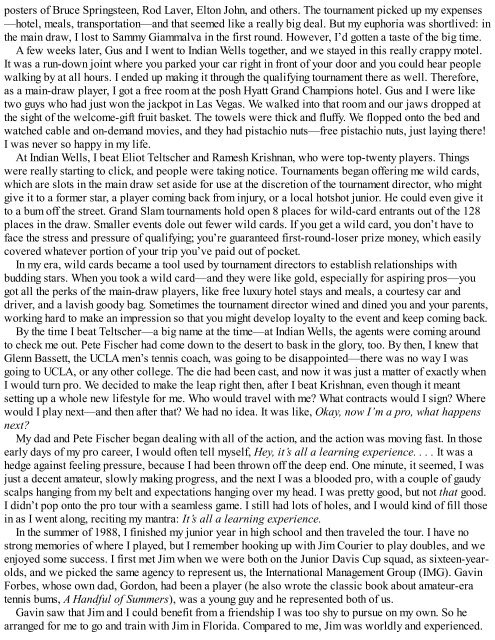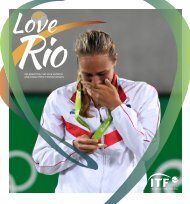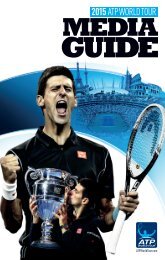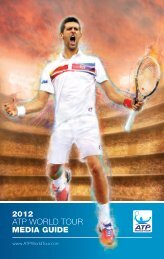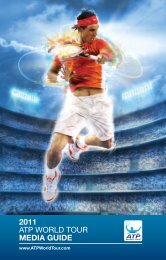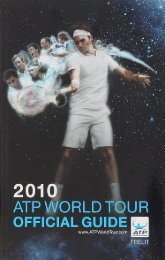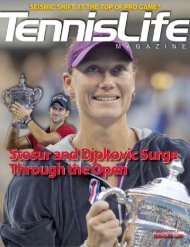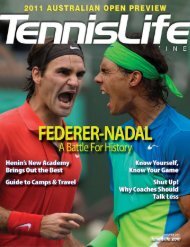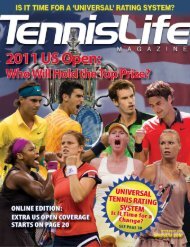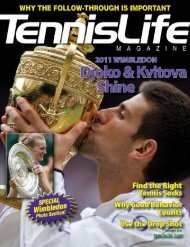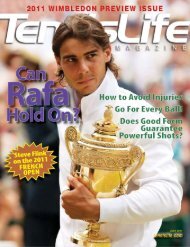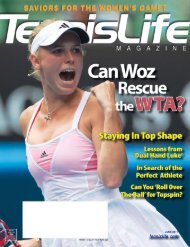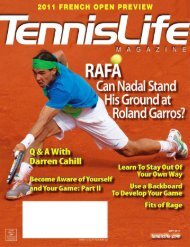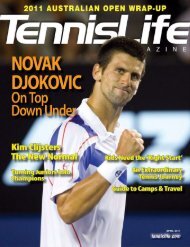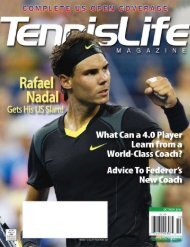A Champion's Mind - Pete Sampras
www.tennismoscow.me Insta:TENNISMOSCOW
www.tennismoscow.me Insta:TENNISMOSCOW
You also want an ePaper? Increase the reach of your titles
YUMPU automatically turns print PDFs into web optimized ePapers that Google loves.
posters of Bruce Springsteen, Rod Laver, Elton John, and others. The tournament picked up my expenses<br />
—hotel, meals, transportation—and that seemed like a really big deal. But my euphoria was shortlived: in<br />
the main draw, I lost to Sammy Giammalva in the first round. However, I’d gotten a taste of the big time.<br />
A few weeks later, Gus and I went to Indian Wells together, and we stayed in this really crappy motel.<br />
It was a run-down joint where you parked your car right in front of your door and you could hear people<br />
walking by at all hours. I ended up making it through the qualifying tournament there as well. Therefore,<br />
as a main-draw player, I got a free room at the posh Hyatt Grand Champions hotel. Gus and I were like<br />
two guys who had just won the jackpot in Las Vegas. We walked into that room and our jaws dropped at<br />
the sight of the welcome-gift fruit basket. The towels were thick and fluffy. We flopped onto the bed and<br />
watched cable and on-demand movies, and they had pistachio nuts—free pistachio nuts, just laying there!<br />
I was never so happy in my life.<br />
At Indian Wells, I beat Eliot Teltscher and Ramesh Krishnan, who were top-twenty players. Things<br />
were really starting to click, and people were taking notice. Tournaments began offering me wild cards,<br />
which are slots in the main draw set aside for use at the discretion of the tournament director, who might<br />
give it to a former star, a player coming back from injury, or a local hotshot junior. He could even give it<br />
to a bum off the street. Grand Slam tournaments hold open 8 places for wild-card entrants out of the 128<br />
places in the draw. Smaller events dole out fewer wild cards. If you get a wild card, you don’t have to<br />
face the stress and pressure of qualifying; you’re guaranteed first-round-loser prize money, which easily<br />
covered whatever portion of your trip you’ve paid out of pocket.<br />
In my era, wild cards became a tool used by tournament directors to establish relationships with<br />
budding stars. When you took a wild card—and they were like gold, especially for aspiring pros—you<br />
got all the perks of the main-draw players, like free luxury hotel stays and meals, a courtesy car and<br />
driver, and a lavish goody bag. Sometimes the tournament director wined and dined you and your parents,<br />
working hard to make an impression so that you might develop loyalty to the event and keep coming back.<br />
By the time I beat Teltscher—a big name at the time—at Indian Wells, the agents were coming around<br />
to check me out. <strong>Pete</strong> Fischer had come down to the desert to bask in the glory, too. By then, I knew that<br />
Glenn Bassett, the UCLA men’s tennis coach, was going to be disappointed—there was no way I was<br />
going to UCLA, or any other college. The die had been cast, and now it was just a matter of exactly when<br />
I would turn pro. We decided to make the leap right then, after I beat Krishnan, even though it meant<br />
setting up a whole new lifestyle for me. Who would travel with me? What contracts would I sign? Where<br />
would I play next—and then after that? We had no idea. It was like, Okay, now I’m a pro, what happens<br />
next?<br />
My dad and <strong>Pete</strong> Fischer began dealing with all of the action, and the action was moving fast. In those<br />
early days of my pro career, I would often tell myself, Hey, it’s all a learning experience. . . . It was a<br />
hedge against feeling pressure, because I had been thrown off the deep end. One minute, it seemed, I was<br />
just a decent amateur, slowly making progress, and the next I was a blooded pro, with a couple of gaudy<br />
scalps hanging from my belt and expectations hanging over my head. I was pretty good, but not that good.<br />
I didn’t pop onto the pro tour with a seamless game. I still had lots of holes, and I would kind of fill those<br />
in as I went along, reciting my mantra: It’s all a learning experience.<br />
In the summer of 1988, I finished my junior year in high school and then traveled the tour. I have no<br />
strong memories of where I played, but I remember hooking up with Jim Courier to play doubles, and we<br />
enjoyed some success. I first met Jim when we were both on the Junior Davis Cup squad, as sixteen-yearolds,<br />
and we picked the same agency to represent us, the International Management Group (IMG). Gavin<br />
Forbes, whose own dad, Gordon, had been a player (he also wrote the classic book about amateur-era<br />
tennis bums, A Handful of Summers), was a young guy and he represented both of us.<br />
Gavin saw that Jim and I could benefit from a friendship I was too shy to pursue on my own. So he<br />
arranged for me to go and train with Jim in Florida. Compared to me, Jim was worldly and experienced.


